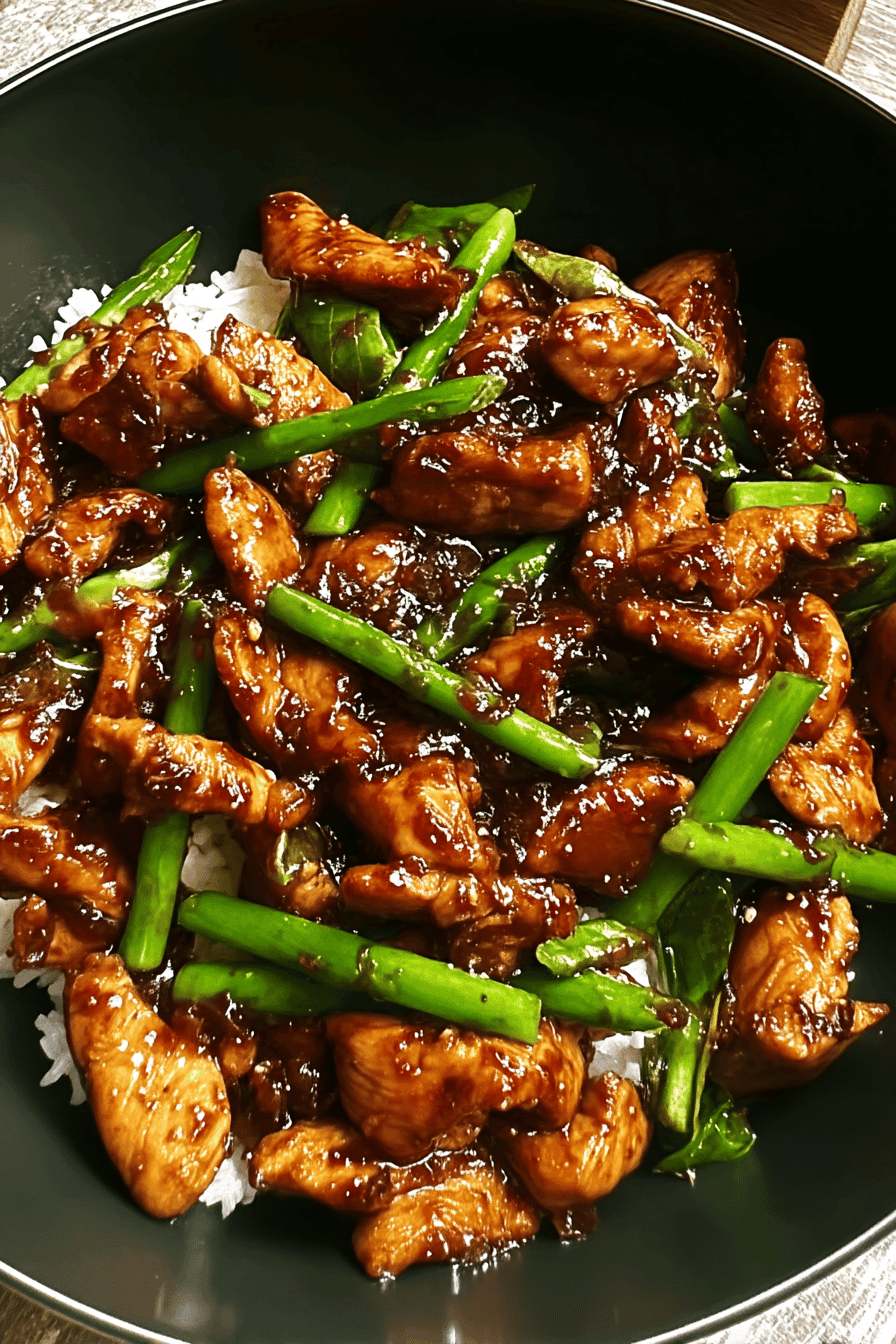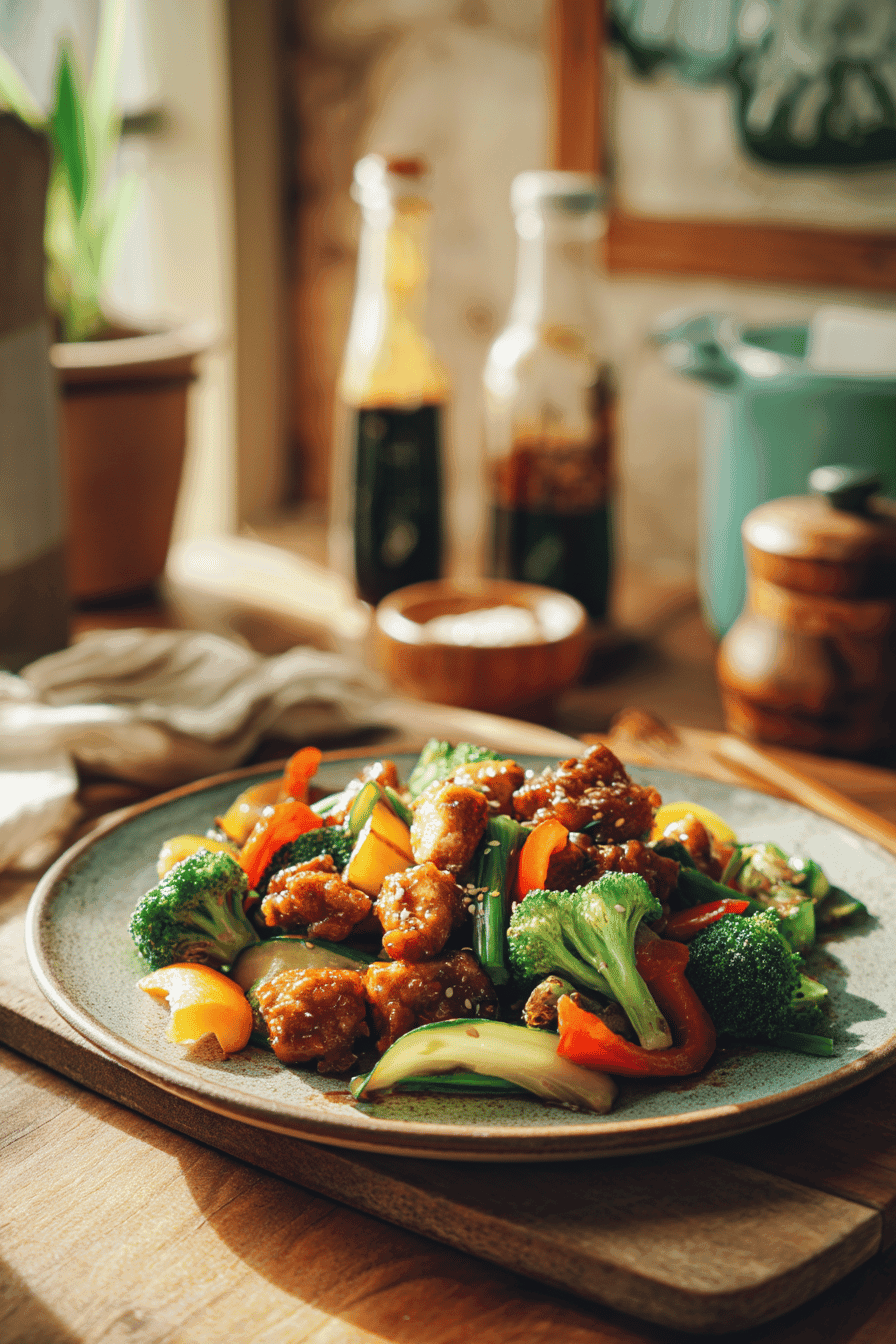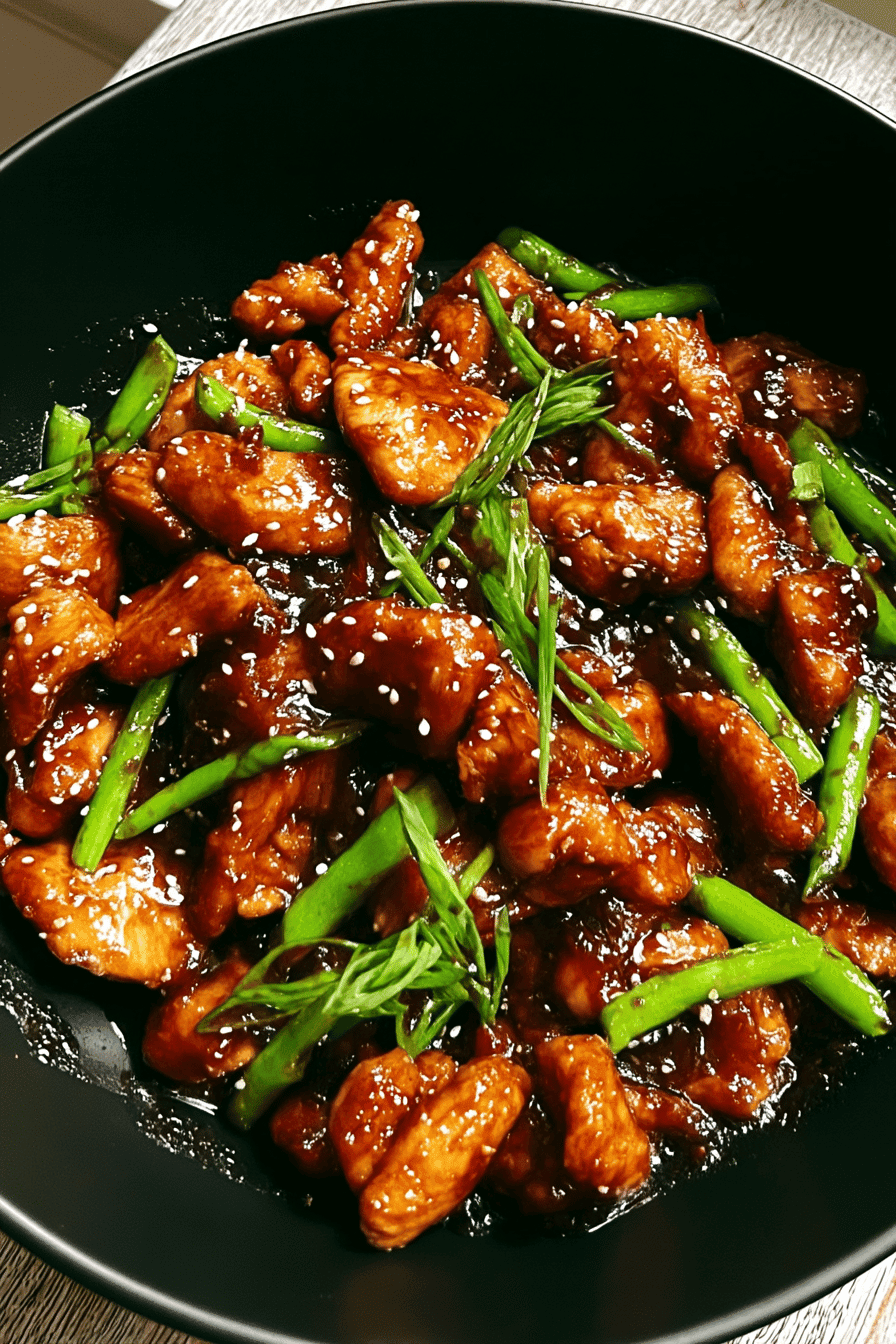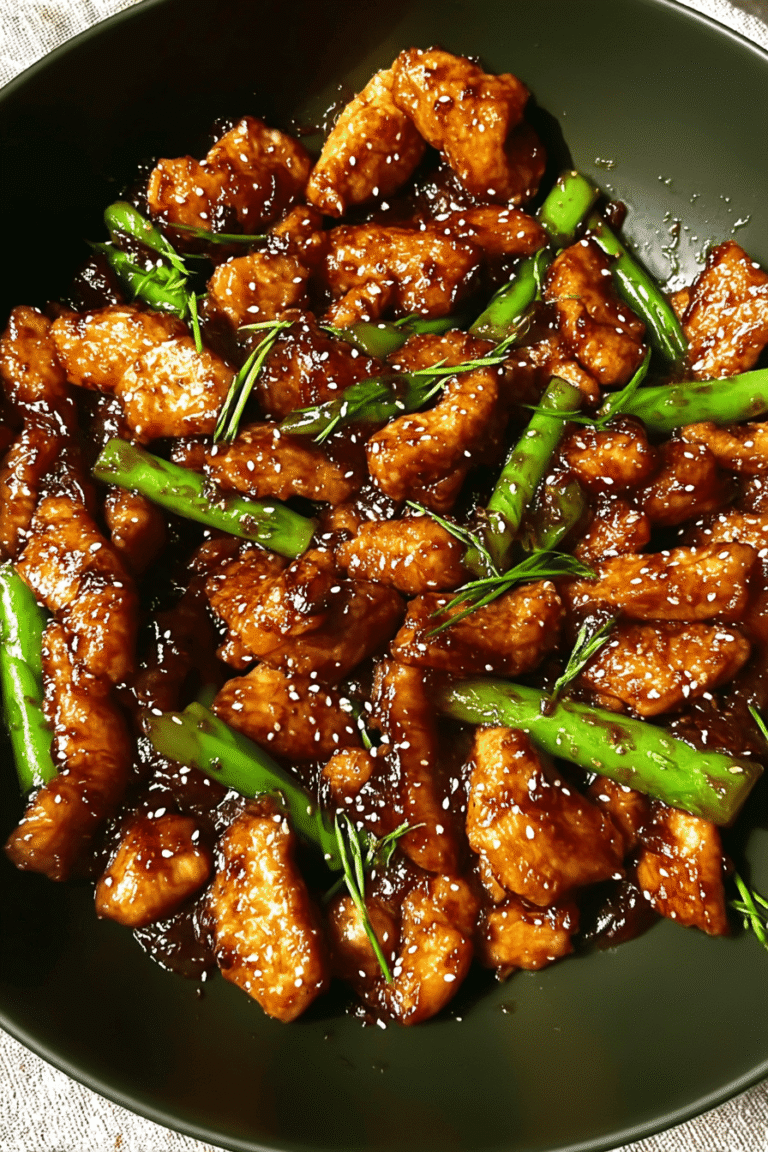Benefits and Advantages of Mongolian Chicken
Mongolian chicken is an exceptionally effective recipe due to its ease of preparation and numerous health benefits. This dish requires minimal ingredients and straightforward steps, making it perfect for cooks of all skill levels who want a flavorful meal without spending hours in the kitchen.
It stands out because it balances rich, savory flavors with lean protein, promoting a healthy diet. The crispy texture from the coated chicken combined with the sweet and savory sauce creates a satisfying and hearty meal. Additionally, Mongolian chicken’s versatility allows easy adjustment to various dietary preferences such as low-calorie or gluten-free diets, enhancing its broad appeal.
This Mongolian-style chicken dish is a delicious fusion of convenience and taste, perfect for busy weeknights and impressive enough for guests.
Jump to:
- Benefits and Advantages of Mongolian Chicken
- Essential Ingredients for Mongolian Chicken
- Dietary Substitutions to Customize Your Mongolian Chicken
- How to Prepare the Perfect Mongolian Chicken: Step-by-Step Guide
- Mastering Mongolian Chicken: Advanced Tips and Variations
- How to Store Mongolian Chicken: Best Practices
- Nutritional Value of Mongolian Chicken
- FAQs: Frequently Asked Questions About Mongolian Chicken
- What is Mongolian chicken and where did it originate?
- Can I use chicken thighs instead of chicken breasts for Mongolian chicken?
- How can I add vegetables to Mongolian chicken, and which ones work best?
- What type of pan should I use to cook Mongolian chicken at home?
- How long can I store leftover Mongolian chicken, and what’s the best way to reheat it?
- Quick and Easy Mongolian Chicken Recipe for Flavorful Homemade Dinner
- Ingredients
- Instructions
- Last Step:
- Notes
- Nutrition
- Did you make this recipe?
Essential Ingredients for Mongolian Chicken
- 1 1/4 pounds (about 570g) boneless skinless chicken breast or thighs, thinly sliced (preferably ¼-inch or thinner) or cut into 1-inch cubes
- 1/4 cup plus 2 teaspoons cornstarch, divided
- 3 tablespoons vegetable oil (plus up to 1/3 cup for frying if deep frying)
- 1 1/2 teaspoons minced garlic (2 cloves)
- 1 teaspoon minced ginger (about ½ tablespoon)
- 1 teaspoon toasted sesame oil
- 1/2 cup low sodium soy sauce (plus extra for batter or marinade if desired)
- 1/3 to 1/2 cup water or low sodium chicken stock
- 1/2 cup dark brown sugar (adjust to taste)
- 1/2 cup green onions (scallions), cut into 1-2 inch pieces (white and green parts separated)
- Optional: 5 dried chili peppers or 1/4 teaspoon Chinese five-spice powder
- Salt and black pepper to taste
Each ingredient plays an important role: soy sauce delivers rich umami depth; brown sugar adds sweetness; garlic and ginger provide aromatic qualities; sesame oil imparts a nutty aroma; and green onions bring freshness to balance flavors. Proper measurement is key for harmonious results.

Dietary Substitutions to Customize Your Mongolian Chicken
Adapting Mongolian chicken for various dietary needs is straightforward and preserves its core flavors.
- Gluten-free: Replace regular soy sauce with tamari or coconut aminos to eliminate gluten without losing savory intensity.
- Vegan and vegetarian: Use firm tofu, tempeh, or seitan as a protein substitute. These absorb sauce well and replicate chicken texture.
- Low-calorie: Reduce brown sugar and oil quantities or use sugar substitutes like stevia. Incorporate more vegetables such as broccoli, bell peppers, or zucchini for volume and added nutrients without many calories.
These adjustments maintain the dish’s essence and flavor profile while expanding its accessibility. Adding colorful vegetables also enhances texture and nutritional value.

How to Prepare the Perfect Mongolian Chicken: Step-by-Step Guide
- Prepare the chicken: For easier slicing, partially freeze the chicken before cutting. Slice thinly (¼-inch) or cut into 1-inch cubes depending on your texture preference.
- Coat the chicken: Evenly coat the pieces with 1/4 cup cornstarch by shaking them in a resealable bag or mixing thoroughly. Optionally, marinate briefly in soy sauce, garlic, and cooking wine for extra flavor, followed by a double dredge in cornstarch for crispiness.
- Cook the chicken: Heat vegetable oil in a large pan, wok, or deep fryer over medium-high to high heat. Deep fry in batches at 350°F (177°C) until golden and crispy, approximately 3-5 minutes per batch, or pan-fry in enough oil to coat the bottom, turning until cooked through and browned (~6 minutes). Drain on paper towels.
- Sauté aromatics: Remove excess oil, leaving about 1 tablespoon. Add garlic, ginger, and white parts of green onions (plus dried chili peppers or five-spice powder if desired). Cook briefly until fragrant (~15–30 seconds).
- Prepare the sauce: Add soy sauce, brown sugar, sesame oil, and water (or chicken stock) to the pan. Stir and bring to a simmer, dissolving sugar fully.
- Thicken the sauce: Mix remaining 2 teaspoons cornstarch with 1 tablespoon cold water to create a slurry. Slowly stir slurry into simmering sauce until thickened and glossy (30–60 seconds).
- Combine and cook: Return chicken and green parts of green onions to the pan. Toss thoroughly to coat the chicken in sauce and cook an additional 30 seconds until heated through.
- Serve: Enjoy hot over steamed white jasmine rice, or low-carb alternatives like zucchini or cauliflower rice, or noodles.
Flexible choices in protein cut and cooking style make this stepwise approach practical and adaptable for home cooks.
Mastering Mongolian Chicken: Advanced Tips and Variations
To deepen the flavors of your Mongolian chicken, try marinating the chicken overnight; this allows the soy sauce, garlic, and ginger to fully penetrate the meat for more intense taste. Using dark soy sauce instead of light soy sauce adds a richer color and a more robust flavor to the dish. For a subtle twist on sweetness, swap traditional brown sugar with coconut sugar or honey, adjusting to your preferred level of sweetness.
Incorporating vegetables like snap peas, mushrooms, broccoli, or bell peppers adds appealing texture and nutrition. For variations on protein, shrimp or thinly sliced pork can be substituted for chicken while maintaining the classic Mongolian flavor balance. You can also introduce mild heat by adding dried chili peppers, crushed red pepper flakes, or a dash of Chinese five-spice powder.
These twists let you customize the traditional Mongolian chicken, inviting creativity while preserving its signature sweet-savory and aromatic profile.
How to Store Mongolian Chicken: Best Practices
After cooking, allow the Mongolian chicken to cool slightly, then transfer it to an airtight container and refrigerate promptly ideally within two hours to preserve freshness. Stored in this way, it will stay good for 3 to 4 days.
For longer storage, freeze the chicken in a tightly sealed freezer-safe bag or container for up to 2 months. When reheating leftovers, gently warm in a skillet over medium-low heat or use a microwave, adding a splash of water or chicken stock to prevent the sauce from drying out and to maintain moisture. Stir occasionally to ensure even heating.
Using a nonstick pan for reheating can help prevent sticking, and reheating slowly preserves the chicken’s juicy texture and flavorful sauce.
Nutritional Value of Mongolian Chicken
| Nutrient | Approximate Amount per Serving |
|---|---|
| Calories | 210–654 kcal (depending on chicken cut and cooking method) |
| Protein | 20–32 grams |
| Carbohydrates | 19–70 grams |
| Fat | 6–28 grams (lower with pan-frying, higher with deep-frying) |
| Sodium | 733–1326 mg |
| Sugar | 7–27 grams |
Mongolian chicken provides a good source of protein important for muscle health and repair. The brown sugar adds carbohydrates, while the use of lean chicken breast or thighs can control fat levels. Garlic, ginger, and green onions contribute antioxidants and micronutrients. For a healthier take, reduce sugar quantities and use tamari for lower sodium content.
Learn more about the nutritional value of chicken breast to complement this information.

FAQs: Frequently Asked Questions About Mongolian Chicken
What is Mongolian chicken and where did it originate?
Can I use chicken thighs instead of chicken breasts for Mongolian chicken?
How can I add vegetables to Mongolian chicken, and which ones work best?
What type of pan should I use to cook Mongolian chicken at home?
How long can I store leftover Mongolian chicken, and what’s the best way to reheat it?

Quick and Easy Mongolian Chicken Recipe for Flavorful Homemade Dinner
🐔 This Quick and Easy Mongolian Chicken delivers irresistible Asian flavors right from your kitchen in just minutes!
🍚 Perfect for a flavorful homemade dinner, it boasts a perfectly crispy texture and savory-sweet sauce everyone will love.
- Total Time: 35 to 65 minutes
- Yield: 4 servings 1x
Ingredients
1 1/4 pounds boneless skinless chicken breast or thighs, thinly sliced
1/4 cup plus 2 teaspoons cornstarch, divided
3 tablespoons vegetable oil
1 1/2 teaspoons minced garlic
1 teaspoon minced ginger
1 teaspoon toasted sesame oil
1/2 cup low sodium soy sauce
1/3 to 1/2 cup water or chicken stock
1/2 cup dark brown sugar
1/2 cup green onions (scallions), cut into pieces
Salt and black pepper to taste
Optional: 5 dried chili peppers or 1/4 teaspoon Chinese five-spice powder
Instructions
1. Partially freeze chicken for easier slicing, then slice thinly or cut into cubes.
2. Coat chicken with 1/4 cup cornstarch, shaking in a resealable bag or mixing well.
3. Heat oil in a pan or wok over medium-high heat and fry the chicken in batches until golden and crispy, 3-5 minutes per batch. Drain on paper towels.
4. Remove excess oil, then add garlic, ginger, and white parts of onions to the pan; cook for 15-30 seconds until fragrant.
5. Add soy sauce, brown sugar, sesame oil, and stock to the pan; bring to a simmer.
6. Mix remaining cornstarch with water to create a slurry, stir into the sauce until thickened.
7. Return chicken and green onion tops to the pan; toss to coat and heat through.
8. Serve hot over rice or noodles.
Last Step:
Please leave a rating and comment letting us know how you liked this recipe! This helps our business to thrive and continue providing free, high-quality recipes for you.Notes
🍴 Use chicken thighs for juicier meat; breasts are leaner and may dry if overcooked.
🌶️ Adjust sugar and chili for desired sweetness and heat level.
🥦 Adding vegetables like bell peppers or broccoli enhances nutrition and color.
- Prep Time: 15 minutes
- Marinating (optional): 30 minutes
- Cook Time: 20 minutes
- Category: Main Course
- Method: Stir-Fry
- Cuisine: Asian
- Diet: Gluten-Free
Nutrition
- Serving Size: 1 portion
- Calories: 432 kcal
- Sugar: 12 grams
- Sodium: 980 mg
- Fat: 15 grams
- Saturated Fat: 3 grams
- Unsaturated Fat: 12 grams
- Trans Fat: 0 grams
- Carbohydrates: 36 grams
- Fiber: 2 grams
- Protein: 30 grams
- Cholesterol: 85 mg







